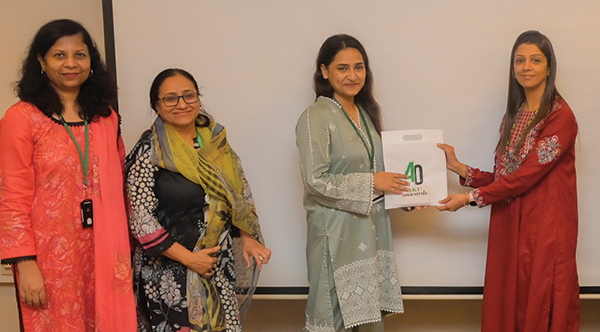As is pre-dominant in rural and semi-urban Pakistan, where healthcare resources are limited and OB/GYNs a luxury, midwives take centre stage in delivering maternal and newborn healthcare, especially for birthing cases with no complications.
While midwives across the country make do with minimal resources, the ones practising in remote regions with extreme winters have additional battles to fight. Sana Sultan, an MScN scholar at the AKU School of Nursing and Midwifery, studied the silent heroes of

Left to Right: Dr Laila Ladak, Dr Rafat Jan, Sana Sultan, Dr Zahra Hoodbhoy, at Sana's MScN thesis defense
Gilgit-Baltistan (GB) as her thesis research project, under the direction and mentorship of her supervisor, Dr Rafat Jan, Professor & Associate Dean, Outreach & Policy Unit, AKU-SONAM, and President, Midwifery Association of Pakistan.
The study sheds light on the challenging conditions the midwives of GB endure and the strategies they employ to provide maternal care amidst severe weather conditions. With stakes particularly high in Gilgit-Baltistan due to heavy snowfall and harsh winters, access to healthcare facilities gets severely hindered. These conditions contribute to heightened risks of maternal infections and newborn hypothermia, further complicated by the scarcity of resources such as heating, electricity, water, and transport.
“I opted for a qualitative research methodology. Data collection was conducted through individual semi-structured interviews with midwives and the findings were analyzed using qualitative content analysis,” explained Sana during her thesis defense.
The key challenges that the study revealed due to heavy snowfall and freezing temperatures were long travels and access to healthcare facilities; the health of the midwives themselves being at risk; and lack of basic amenities. Heavy snowfall often resulted in road blockages, making transportation unavailable for mothers and midwives alike. This forced midwives to navigate icy roads on foot, making their journeys long and difficult.
“As we had expected, the study shows that midwives demonstrated remarkable resilience in going above and beyond their duty to ensure the safety and health of patients. Accurately known for ingenuity, these midwives make use of local knowledge and traditional practices such as burning Bukhari (traditional stove) for heating, fetching ice water from the river for hygiene and sterilization purposes, and performing kangaroo mother care for the prevention of newborn hypothermia,” explained Dr Rafat Jan.
As recommendations for the future, the study emphasizes on improving infrastructure, ensuring reliable heating and electricity, implementing telemedicine services, dedicated emergency transport, and maternity health centers in remote areas. Additionally, training for midwives on managing hypothermia and other winter-related emergencies was marked as crucial.
“It gives me great pleasure to see our Masters’ scholars working on such crucial research studies in our local context. By highlighting the plea of these midwives, the study calls for urgent attention of policymakers to their needs for better maternal and newborn health in the region,” says Dr Laila Ladak, Assistant Dean of Graduate Programmes at the School.
“At the start of this study, I did not fully realise what conditions the midwives of GB were working in. However, as I delved deeper into the research, I discovered that their trials were far more severe than I had imagined. I’m grateful to my thesis supervisor and teachers who allowed me to conduct such an important study which has allowed me to amplify the voices of midwives of Gilgit-Baltistan and bring their silent dedication to the attention of others,” said Sana.
-
Sana Sultan is a graduate of the MScN Class of 2023, AKU-SONAM, Pakistan.

